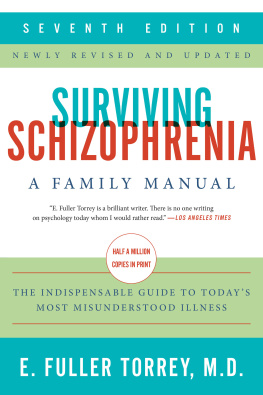The
Essential
Schizophrenia
Companion
ROBERT FRANCIS
with Foreword by Elyn R. Saks, author of
The Center Cannot Hold: My Jour ney
through Mad ness

THE ESSENTIAL SCHIZOPHRENIA COMPANION
Copyright 2020 Robert Francis.
All rights reserved. No part of this book may be used or reproduced by any means,
graphic, electronic, or mechanical, including photocopying, recording, taping or by
any information storage retrieval system without the written permission of the author
except in the case of brief quotations embodied in critical articles and reviews.
iUniverse
1663 Liberty Drive
Bloomington, IN 47403
www.iuniverse.com
844-349-9409
Because of the dynamic nature of the Internet, any web addresses or links contained in
this book may have changed since publication and may no longer be valid. The views
expressed in this work are solely those of the author and do not necessarily reflect the
views of the publisher, and the publisher hereby disclaims any responsibility for them.
Any people depicted in stock imagery provided by Getty Images are models,
and such images are being used for illustrative purposes only.
Certain stock imagery Getty Images.
ISBN: 978-1-6632-0860-6 (sc)
ISBN: 978-1-6632-0861-3 (e)
Library of Congress Control Number: 2020917157
iUniverse rev. date: 09/23/2020
If you are walking on a path thick with brambles and rocks, a path that abruptly twists and turns, its easy to get lost, or tired, or discouraged. You might be tempted to give up entirely. But if a kind and patient person comes along and takes your hand, saying, I see youre having a hard time- here, follow me, Ill help you find your way, the path becomes manageable, the journey less frightening.
Elyn R. Saks, The Center Cannot Hold:
My Journey through Mad ness
CONTENTS
Elyn R. Saks
Robert Franciss book The Essential Schizophrenia Companion is a smart and moving account of living with schizophrenia. Robert is a therapist himself who lives with schizophrenia, and telling his story should be of great use to people who suffer with schizophrenia, their families, and their close friendsand indeed, to members of the general public.
First, Robert takes the reader through the basics of his historywho he is. He next discusses the concept of schizophrenia, issues such as its distinction from mood disorders and the nature of its symptoms (e.g., delusions and hallucinations). He notes also that the presentation of schizophrenia can be very different in different people.
His discussion of anosognosia is thoughtful and well taken. He believes that helping patients see that they lack insight is very important to get them on the same page about treatment. (On the other hand, you can get people interested in treatment even if they lack insight by appealing to things they are experiencing and dont like, such as sleeplessness.)
Robert next has an interesting discussion of the paradoxical nature of schizophrenia and how, once the patient becomes comfortable with routine cognitive paradox, miracles happen, and yet twice again!
By behavioral rationality , Robert means that in the midst of difficult and scary symptoms, he is able to practice a sort of manneristic reasonableness. A colleague of mine, with bipolar disorder, and I talk about this as passing as normal. It allows one to live in ones work and personal worlds without facing the stigma one would confront if public about ones illness.
In the chapter Protective Factors, Robert discusses as one of his primary ones his taking antipsychotic medicine for over twenty-five years. He recognizes there are disputes in society about taking these and believes people should make their own best judgments. The medicine he has been on is called clozapine. (It is the Cadillac of efficacy but is cumbersome, requiring lots of blood tests, so it is only used if a patient fails on other drugs.)
Robert also makes good use of psychotherapy. It used to be thought that meds alone were sufficient for treating schizophrenia, but it is now recognized that the treatment of choice is medication combined with some form of psychosocial treatment.
One way Robert makes use of therapy is when his therapist does some reality testing for him, pointing out that his perceptions are significantly distorted. This actually brings him back to reality.
Roberts lifestyle generally is healthy: he doesnt drink or do drugs, exercises regularly, sleeps well, and he fills his life with enjoyable things such as fantasy football. He also gets great benefit from his faith in God.
Robert speaks interestingly about philosophy of mind and its connection with schizophrenia. For example, he wonders if [his] mind is indeed differentiated from the rest. Many people with schizophrenia, he says, have delusions that reflect a reality that challenges the very presumption of differentiated minds.
Robert lays out thoughts about different kinds and genres of research, including studies of medication treatment and psychosocial interventions.
He ends with a chapter titled Putting It All Together, noting, for example, that we all have challenges of one kind or another. He also points out how humor has been helpful in his life: Its okay to laugh at psychosis.
In all, The Essential Schizophrenia Companion is a profound, moving, and thoughtful account of living life with a serious mental illness. It is said that putting a human face on mental illness is the best way to reduce stigma. The Essential Schizophrenia Companion meets this calling and does so in spades!
Enjoy your read!
As we depart on our literary journey, my dear reader, let me first supply the vessel for our travel. We will need a few bits of knowledge prior to departure. First, The Essential Schizophrenia Companion is a follow-up volume to my first book on schizophrenia entitled On Conquering Schizophrenia: From the Desk of a Therapist and Survivor, with Purview on Metaphysics, Philosophy, and Theology . In this newest literary venture, there will be certain similarities and differences to the one prior. Allow me to explain.
As far as the similarities, we must of course start with authorship: it is I who wrote it. Further similarity will involve the target of the relegation of schizophrenia. In purpose, this is similar to the last. A final similarity will be in my writing style. More specifically yet, my writing style pushes my voice to you. Im writing directly to you, reader, and I do so with the utmost respect for your own brilliance and shining soul. I never patronize, because I know of your own personal brilliance. As such, I am honored by your readership. So it is together that we launch on our literary journey. I truly appreciate your company and find you a soothing presence. Your brilliance illuminates my literation! I thank you for your accompaniment.
If you read my previous book, you know that I dabbled in various genres, including metaphysics, philosophy, and theology. My target was the relegation and mitigation of schizophrenia, and these genres were my tools to do so. This volume will resonate similarly in that the priority is the defeat of the wily foe known as schizophrenia. This is unchanged from the last. However, this volume lacks the genre meandering of the last. This book is more pointed. Each chapter resides of its own accord and can be read singularly or randomly, as well as by its customary ordination.
And so, my dear reader, we begin a new journey of friendship joined by the common theme of the defeat of the ever elusive and enigmatic parlance known as schizophrenia. Along the way, let us not forget our capacity for a shared humor. If one cannot laugh at ones troubles, they will double! Our topic is a serious one, but let us not be thrust into an unnecessary melancholia. Schizophrenia is a formidable foe but also subject to some comedic relief. Please, I urge you to never forget the everlasting salve and palliation of a good humor!
Next page











